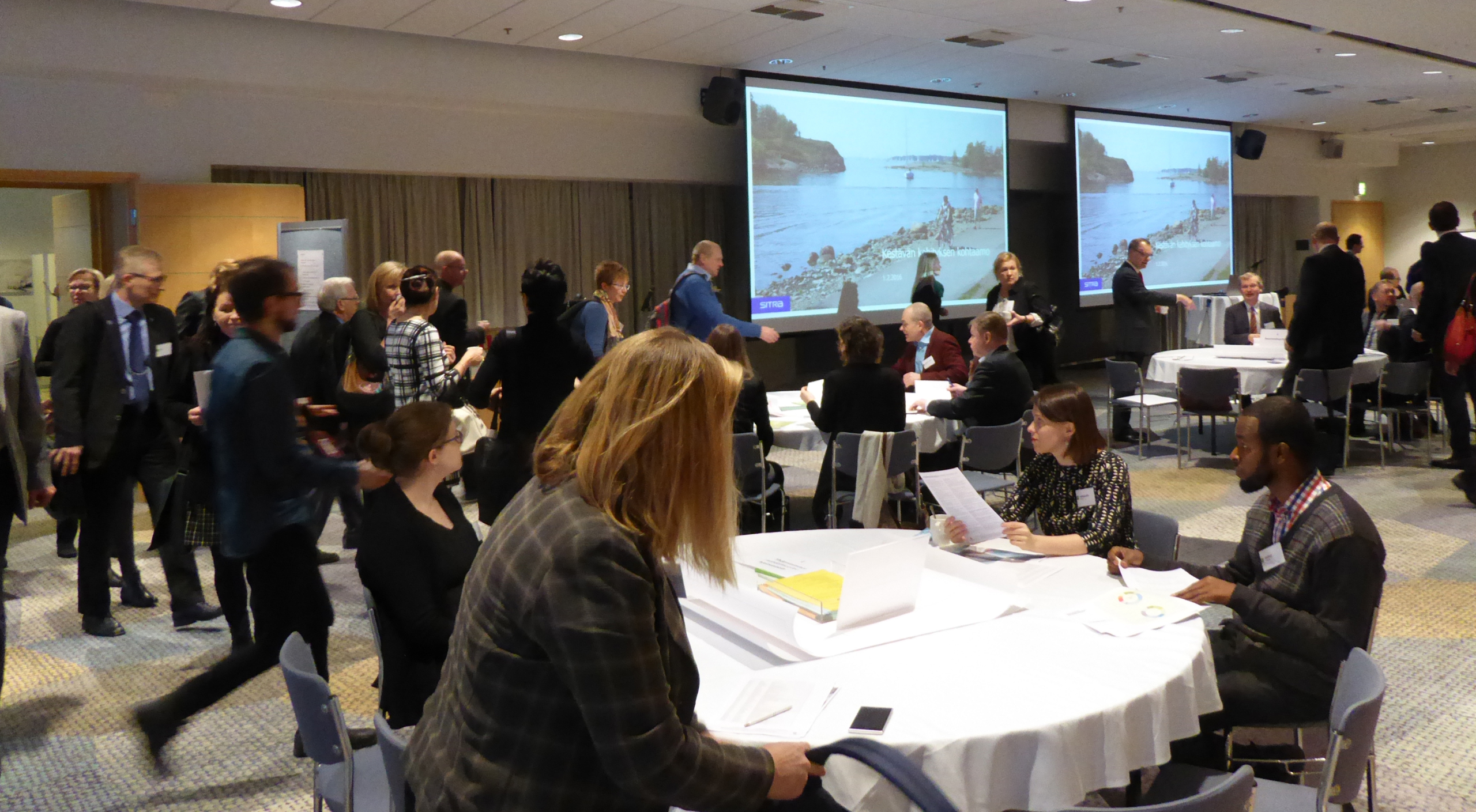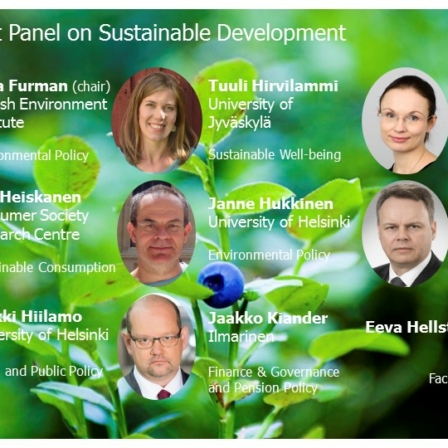The recently appointed Finnish National Commission on Sustainable Development started its activities with a forward-leaning approach. At an intensive workshop on the first Monday morning of February, Finland’s current strategy for sustainable development was mulled over and developed further.
The idea for the workshop was born last year from the Expert Panel on Sustainable Development, which was eager to begin co-operation with the new commission. In her opening address, the chair of the expert panel Eeva Furman reminded the audience that the purpose of the Expert Panel on Sustainable Development is to support the commission and the whole of Finland by providing well-researched information to support decision-making.
“The panel meetings have an unreserved atmosphere, and you can even present wild ideas there – as yourself and without embarrassment. We organised this workshop because we wanted to infect the commission’s work with this open method of discussion,” Furman told the workshop participants.
The preparations for the workshop also included a preliminary survey, whose results gave strong indications of the desired guidelines for developing the commission’s work – as well as the work of the expert panel supporting it. The commission went to work eagerly. Everyone seemed to agree that this work must be done with genuine interaction and by listening to and valuing each other. No speeches for the sake of making a speech; talking to develop things together.
Supplementing the goals, principles and vision
Based on the preliminary survey, the new commission members seemed to be well versed with the work on sustainable development carried out in Finland so far, and they considered the current vision of sustainable development as well formulated. But they did think it still needed more from the point of view of global responsibility, as well as from the points of view of humans and from the perspective of well-being. In the future, they hoped that society’s ability to change and good governance would be better taken into account in the vision.
One of the things inherent to renewing the goals is the new framework for the United Nations Agenda 2030. In addition, the expert panel raised the question of which change factors should be taken into account when updating the sustainable development goals, and the commission mulled over these issues in groups. One of the issues discussed was how our society can adjust to a lower-emission economy with scarcer resources, or how to gain a better quality of life with fewer resources. And how vital for our well-being is experience of influence? How is the labour market affected by the transformation of working life and the pressures from international migration? Where can room be found for solar and wind power innovation within the framework of basic power and a limited network capacity? How can one take the increasing interest in experimental development into account?
Even sustainable development is developing
Even though sustainable development has been discussed for decades, the issue is still just as topical as it was a quarter of a century ago. The goals of sustainable development must change with the times, but so must the methods of promoting sustainable development. Eeva Hellström, facilitator of the workshop and expert panel, reviewed the words addressed to the new members by the previous commission: together, with a forward-leaning approach, actions and responsibility. These words highlighted the importance of dialogue, best practices and the role of an initiator. How did the commission respond?
The new commission wished for an exchange of experiences, information sharing and debate. The encouraging interaction in well-prepared and effective meetings was seen as a central part of the co-operation. In addition to the official co-operation, unofficial meetings and work in small groups regarding different themes were of interest. The commission also wanted to harness the competence of deputy members.
When the aim is to promote sustainable development in politics and governance, the ability to make decisions is seen as key. The decisions must be consistent and impact assessments must be made for them. The participants wanted to include sustainable development in the public sector’s steering processes systematically.
The importance of the multi-actor model was brought up, as well as participatory processes. In particular, the commission wanted to take children and young people better into account in its work. Changes to the commission’s name were also proposed so that it could reflect the dynamic and interactive operating methods better.
The commission members were clearly excited, and eager to challenge the expert panel. The need for expert knowledge was considered to be great, both to support the work and to challenge it, and the expert panel was seen as playing an important role that could even be strengthened. The commission also wanted to strengthen the synergy between different expert panels.
The Secretary General of the Commission on Sustainable Development, Annika Lindblom, was very pleased with the commission’s engagement with the subject and used her address to encourage everyone to continue the co-operation in a similarly relaxed way without unnecessary formality.
Giving wings to commitment
In the workshop, the participants clearly expressed their expectations of each other: a commitment to common goals and a genuine desire to implement change. In addition to the commission, they also want to do this work through their own jobs and networks.
The Society’s Commitment to Sustainable Development is a model developed for Finland in order to extend sustainable development to cover the whole of society. Everyone’s effort is needed to disseminate the commitment. The Deputy Secretary General of the Commission, Marja Innanen, showed examples of operational commitments that have already been made and different methods that various people and organisations have used to highlight their commitment to their work. She emphasised how important the role communication plays in giving wings to society’s commitment.
Encouraged about how socially representative the new commission was, Innanen called on everyone to seize the proposal of the commission’s vice chair, Minister Kimmo Tiilikainen, that all members of the commission should draw up their own commitment and encourage all their contacts to do the same. In order to create a snowball effect, she proposed that the commission should aim to gain pledges to 10,000 commitments as a gift to Finland for its 100th anniversary.
As a communications professional, I was happy to see how the commission highlighted the importance of communications and everyone’s commitment to passing on the message, both in the preliminary survey and at the workshop. In order to get the message through to more people and with more impact than before, the new commission wants to make communications bolder and more accessible to the public. And because there are countless methods, everyone can find one that suits them the best, whether it happens within one’s own organisation, on social media, at events or in media interviews.
The morning was productive: it resulted in a united vision on Finland’s strategy for sustainable development and on what kind of activities, practices and communications should be constructed for the commission. This is a good place to start the co-operation again!




Recommended